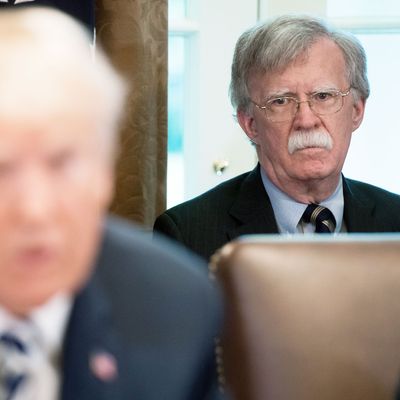
Donald Trump and John Bolton share an affinity for casually threatening to obliterate foreign nations that are not at war with the United States.
But in Bolton’s case, that belligerent rhetoric reflects a deeply held belief that America can – and should – bend adversarial regimes to its will through blunt military force. The president, by contrast, has few (if any) deeply held beliefs about foreign policy: He likes to play the maniacally tough commander-in-chief, promising “fire and fury like the world has never seen” – but he also covets the title of historic deal-maker.
This is a problem for the president’s latest national security adviser. Last month, Bolton suggested that the United States would push for the “Libya” model of denuclearization at Trump’s June summit with Kim Jong-un. On the surface, this was a call for North Korea to immediately – and unilaterally – relinquish its entire nuclear weapons program. This, by itself, would have ruffled Pyongyang’s feathers. But the statement was also freighted with an even more menacing subtext: After all, Libya’s experiment with “denuclearization” ended with its longtime dictator being brutally murdered by U.S.-backed rebels, less than a decade after he’d forfeited his nuclear program.
North Korea did not take kindly to this rhetoric, and threatened to abandon the summit; then Trump decided to abandon it first.
For Bolton, the collapse of these talks was a victory: Before joining the administration, he had publicly argued that diplomacy with Pyongyang was futile – and that the United States needed to deter its nuclear program militarily, as soon as possible. But for Trump, the summit’s premature death was painful. He had dreamed of succeeding where his predecessors had failed, of making a deal that would secure his status as a “great man of history.”
And so, the president eagerly accepted the first halfway conciliatory gesture from Pyongyang as a rationale for putting the summit back on his schedule. Now, he intends to keep it there – by keeping Bolton sidelined. As CNN reports:
As President Donald Trump huddled in the Oval Office on Friday with Kim Jong Un’s right-hand man, he was accompanied by only one other US official: Secretary of State Mike Pompeo. Absent was the administration’s most vocal North Korea hawk, national security adviser John Bolton…Pompeo told Trump it would be “counterproductive” to allow Bolton to attend the Oval Office meeting with visiting North Korean official Kim Yong Chol, two people familiar with the matter said, citing an escalating feud between the top diplomat and Bolton.
…Pompeo views Bolton skeptically, two people familiar with their relationship say, and doesn’t trust his motives on North Korea. The two men barely knew each other before Bolton’s arrival as national security adviser, but Pompeo has grown to dislike his approach and believes he is “trying to advance his own agenda,” one official said.
Bolton wasn’t the only administration official whose belligerent rhetoric had inflamed Pyongyang. The president himself said last month, “if you look at that model with Gaddafi, that was a total decimation. We went in there to beat him. Now that model would take place if we don’t make a deal, most likely.” On its face, this statement is far more bellicose than Bolton’s: The national security adviser used a term with a sinister subtext; the president explicitly threatened to have Kim murdered – and his regime destroyed – if he refuses to concede to American demands.
But the difference is that Bolton meant what he said, while the meaning of any presidential statement is subject to perpetual change. The clearest sign that Bolton’s influence is waning – after just two months as Trump’s (third) head of the national security council – is that the White House is already signaling that it will accept incremental (and/or symbolic) progress toward the denuclearization of North Korea as a victory:
Trump and his aides have suggested the most concrete product of the June 12 encounter could be a peace agreement formally ending the Korean War – a far cry from the commitment to immediate denuclearization that the administration once insisted would be required for Trump to come to the table.
Now, the most some aides are hoping for is a broad declaration from Kim that he’s open to getting rid of his weapons, with the work of securing specific commitments from the North Korean regime handed off to aides for a process that experts predict could take years.
Some congressional Democrats are hoping to make this outcome into a political loss for Trump, by adopting Bolton’s view that anything short of “‘the dismantlement and removal’ of all chemical and biological as well as nuclear weapons from North Korea” is unacceptable.
But Pyongyang has no incentive to forfeit its nuclear deterrent, unless it assumes that Washington is willing to wage a mass-casualty, preemptive war against it. And the idea that the U.S. should preemptively bomb a nuclear weapons state – for the sake of mitigating the risk of nuclear war – is insane.
In truth, Trump’s narcissistic desire for affirm his deal-making bona fides on the world stage might actually be a blessing. Not long ago, the president was threatening the “total destruction” of North Korea at the United Nations, and making Freudian boasts about the size of his nuclear button on Twitter. An agreement that averts a return to such belligerence – by instructing each side’s diplomats to work for an indefinite time to reach an ill-defined consensus goal – would be a relatively happy outcome.
And Bolton becoming isolated and irrelevant in the West Wing would be an even happier one.






























